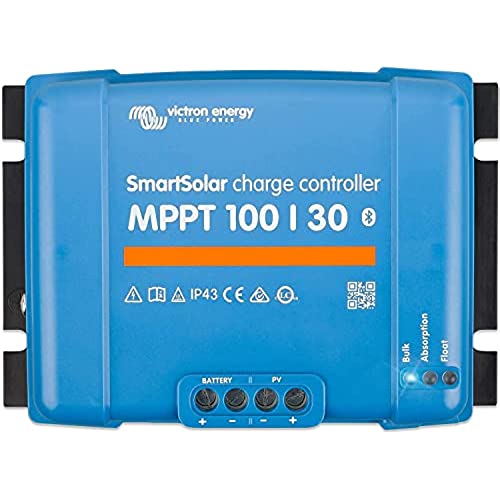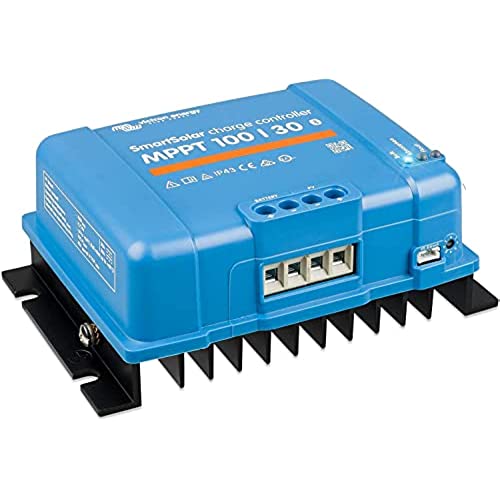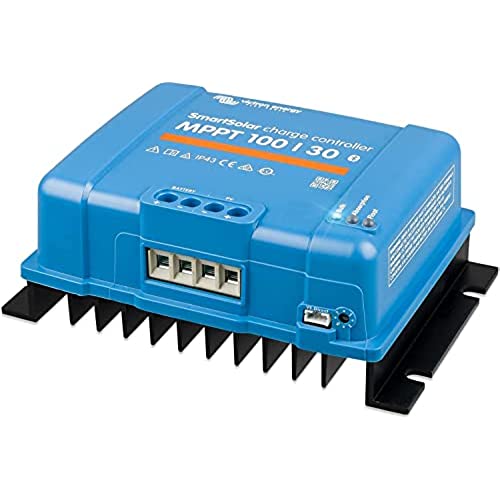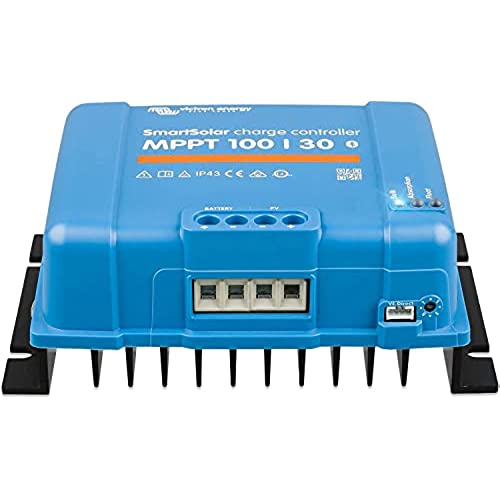









Victron Energy SmartSolar MPPT 100V 30 amp 12/24-Volt Solar Charge Controller (Bluetooth)
-

eLeet
> 24 hourThis is a good little MPPT Controller, Bluetooth, efficient and does what its supposed to do . It also has a Load Output to prevent from draining your battery flat. My only gripe is the specs say the terminals can accept 10AWG or 6mm2. While a bare, stranded 10AWG wire will fit, if you use Ferrules, it will not fit in the terminal. The largest wire this controller will take with a Ferrule installed is about 12AWG. I use Ferrules on ALL connections that use a clamp down terminal. I never allow bare strand wire to be clamped down by the terminal. If you do this, it will smash the wire, spreading it apart, and not allow for a secure connection. Yes, it will work but, with the amount of vibration in a Boat or RV, the use of Ferrules will make for a more secure connection. I returned the 100-15 and purchased a 100-30 Smart Solar MPPT. The 100-30 is the smallest Controller that will accept 6AWG Ferrules. I use 4AWG wire and crimp on 6AWG Ferrules. Works perfect and when cut apart to inspect, the copper is so tight, its almost welded together from the amount of force the ferrules crimp down. FYI, the wire and crimp tools I use are from TemCo. While this controller doesnt need anything bigger than 12AWG wire, I always oversize my conductors for low loss and room for expansion (Future Proofed). Hope this helps someone make the proper choice for their application.
-

John Lunde
> 24 hourI really like Victron Energy SmartSolar MPPT 100V 30 amp 12/24-Volt Solar Charge Controller (Bluetooth). It really is doing everything for me. AAAAA+++++
-

A Miller
> 24 hourWish it came with an included readout giving battery state of charge etc.
-

Steve
> 24 hourI am going to mount this Victron 75/10 Solar Charge Controller on the firewall of my boat. I have a 50 watt solar panel I will be using to keep my battery topped off while in storage. The app was easy to download and after 2 minutes it was done updating itself. The charge controller only took a few minutes to install. In my testing of this solar charge controller over the last two weeks, it has worked better then expected. I am very happy with it and will only be buying Victron in the future. I am using the streetlight function and the load connection to run a 10 watt led light bulb while the boat is in storage. I keep the boat on the side of my house and there is no light there. Now, using the boats battery, the light comes on at night and goes off at sunrise. It only drains the battery a little during the night. Then, the next day, the solar panel charges the battery up to full and maintains it in float mode perfectly. By the way, Im using the QILIPSU Hinged Cover Junction Box, - 150 x 150 x 90mm/5.9 x 5.9 x 3.5(L*W*H) size box. The box seems like it was custom built to fit my Victron 75/10 Solar Charge Controller. It is watertight, made of thick plastic and has stainless steel clasps. Price was very good for the quality.
-

Eric K
> 24 hourI built out a 4x4 Sprinter cargo van as a camper and initally used only the alternator charging (with a 30 amp Sterling Battery to Battery charger) and a short power charger to keep my 310 amp hours of house batteries charged up. I didn’t want to drill through the roof to install solar panels there because of the snow that accumulates there after skiing. By itself the snow might not be a problem, but once I start driving it moves back and forth and eventually slides down the wildshield if I have to make a sudden stop. I was worried that would put extra stress on any roof-mounted solar panels, and possibly cause a water leak in the roof. We’ve all seen leaky RVs covered with a tarp, and I didn’t want that fate. So I bought Renogy’s 200 watt solar suitcase panels (without a controller) and connected the MC4 connectors for those panels to the cut off ends of a 10 AWG cigarette lighter plug that was rated for 25 amps 12v. In turn, that 12v recepticle is hard wired to this charge controller. I was worried that 200 watts of solar and a 15amp charge controller wouldn’t provide enough amps to charge up my battery, but it’s more than enough to recharge the overnight usage from my 130L Isotherm Fridge and Espar D4. I have an iPhone XS and the Victron app works well and doesn’t require location permissions like Android. I’m glad I didn’t get the higher amperage models (100/20 or 100/30) because the 200 watt panel is big enough to keep my batteries charged up and the higher amperage models would have taken up too much space.
-

Towhee
> 24 hourI purchased this charge controller to see if it would bring in more power than the one I was currently using which was the Tristar 45 PWM controller. There is a lot of mixed information out there about whether MPPT actually makes much difference or not. Some say that they increase power by as much as 30 percent and some say that this only rarely happens. Because of the mixed information, I put off buying an MPPT controller for a couple years. I have now had this controller through a summer, fall, and winter in Colorado. The Tristar PWM controller that I was using would typically peak at about 350 watts of power input and this would drop considerably during the winter months. After installing the Victron MPPT controller, the peak watts moved up to about 450 watts which is a 28% increase in power output. More importantly, during the colder winter months (its now January 2019), the Victron MPPT increased its peak power output even more with peak input watts of 500 or more getting to the battery. Sometimes I have seen it as high as 600 watts. The reason for this increase during winter is that as solar panels heat up their voltage drops. As they cool down the voltage goes up. So during winter, when the panels are cold the voltage goes up a lot and the Victron MPPT charge controller can turn that extra voltage into battery power where PWM controllers can not. As a result, with the Victron MPPT controller, my power in summer and winter are nearly identical. During summer the charge hours are longer but the input is lower. During winter the charge hours are short but the cold solar panels voltage is way up and put out more power than they do in summer. I highly recommend this charge controller to everyone but for people in colder climates this type of chage controller is a must have. My system is 6 Renogy 100 watt monocrystaline solar panels hooked at at 24 volts to the Victron charge controller which is hooked up to a 12 volt LifePo4 battery system.
-

JR
> 24 hourThis is a good solar charge controller, once you setup the battery parameters correctly it works really good, it is efficient. What may makes it difficult for some people is the fact that you need the specs from your battery manufacturer to know the battery charge voltages to setup absorption, float, and equalization (only for Flooded or if your battery manufacturer requires that) You need a special usb cable if you plan to use the app in a laptop running windows, unfortunately the bluetooth connection doesnt work for that they say on the Victron forums that they are working on it. The bluetooth app is good, I allow me more distance for monitoring my batteries with more independence, instead of looking to the tiny LCD screen of my old and trusty PWM SCC. UPDATE: this controller have the tendency to consume the battery no matter the chemistry you have. Same thing happens with SLA or LiFePO4 you have the battery all the way to the top and then the controller takes from 12 to 20 amps per day. I have disabled the load, it is permanently off but if you use a voltmeter it shows that you have 0.6 volts on that and 0.1 volts if I disconnect the solar panels. I suppose it is a design defect, but who knows. I will be moving on to a different product this time because at the rate it discharge a battery you are wasting precious solar energy and there are cloudy days that wont allow the battery to be fully charged.
-

B. Haddock
> 24 hourI have three Victron controllers and I love them. Glad I went with Victron. The three I have are the SmartSolar type with Bluetooth. The controllers communicate and I can monitor all of them through their phone app.
-

Valentyna
> 24 hourExcellent
-

kwerks
> 24 hourI really expected to like the Victron Smart Solar. I already own the 100/15 Blue Solar plus bluetooth dongle, and have good results with it. However, after struggling with the Smart Solar I was disappointed and returned it. In my view its a step backward from Blue Solar. If youre thinking of buying the 75/15 Smart Solar, you may want to reconsider and get the 75/15 Blue Solar and buy the external bluetooth dongle. There is really no benefit to the Smart Solar over the Blue Solar + BT dongle. You might save $10-$20, but you end up with an inferior product in many other respects. First, the integrated bluetooth range is much less than the BT dongle. Were talking 5 feet vs. 20 to 30. This also gets to the heart of my main gripe: Victrons choice of Bluetooth transceiver. Theyre using newer BLuetooth Low Energy technology (BLE) vs older but more widely supported BT 4.0, as used in the external dongle. In my view it wasnt a good move. BLE, is not supported by the majority of BT enabled devices. If you want to use iOS or Android, be aware that even if they have BT, they will likely NOT work with the Smart Solar bluetooth! Obviously this isnt a good selling point and Victron sales literature doesnt warn customers about this ahead of time. Youll end up downloading their app and get frustrated trying to connect to the controller, and eventually learn that your 1 year old device wont work with it. Nearly every device in the world with BT will work with BT 4.0, but Victron went with the BT low energy and gave up compatibility with the majority of the worlds devices. Was that a smart decision? Well they saved a few cents per controller, and I suppose low energy in theory saves some power. But, the charge controller is NOT lacking for power. Its either getting power from a PV array or a presumably large battery, not a tiny batteries where BLE might be useful. I would much rather have 20-30 foot range and use a few more micro watts of power than need to stand 5 feet from the controller. And youll find with Android, that BLE *requires* that you enable location/GPS for the Victron Connect app to work! No kidding. Victron says they dont care about your location, and probably dont. But youll need to accept that and enable location services to use their app with Smart Solar. With Blue Solar and the external dongle its not necessary. This is forced on everyone by Google/Android not Victron, but again, the choice of using BLE was Victrons. Finally, IMO the 100/15 is better constructed than the 75/15, albeit at a higher price. The 100/15 has an external heat sink and the 75/15 does not. That could be a benefit in a hot environment like the desert. You may want to take a look at it. The next step up is 100/20 which also has an external heat sink like the 100/15. All of these have separate load terminals which is really useful because the controllers have a configurable low voltage disconnect (via the app) and can also track how much power the load is actually using. When you get over 20 amps, for example 100/30 amp controllers and up, they do not have separate load terminals. Update: I measured the current draw of a Blue Solar 100/15 and Smart Solar 100/20. Connected to battery at 12.8v. No PV or load connected, and not connected to app via BT. Blue Solar 100/15: 24 mA. With BT dongle 25.5-26 mA Smart Solar 100/20: 34 mA. With BT dongle 35-36.5 mA I dont have numbers for the 75/15, though its likely not more than above. The point is, the BT 4.x dongle takes only 1 to 1.5 mA. Unless youre using a 15 amp MPPT controller with a battery bank the size of a coin cell battery, the BT dongle is the way to go (IMO).
